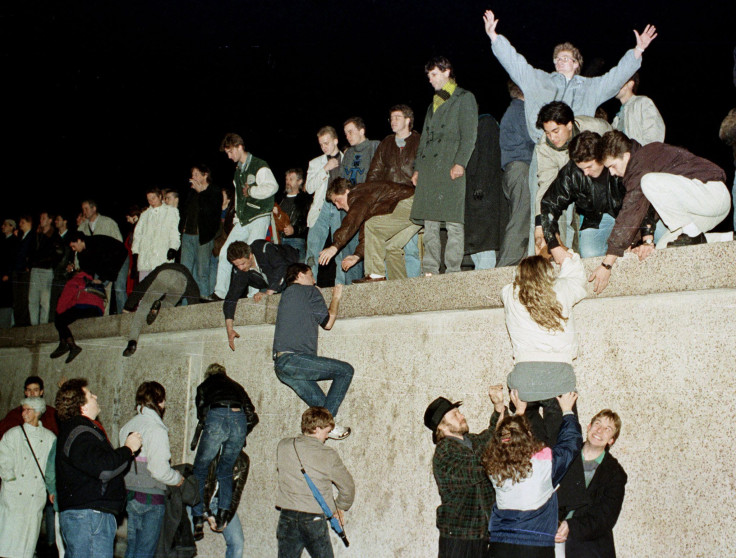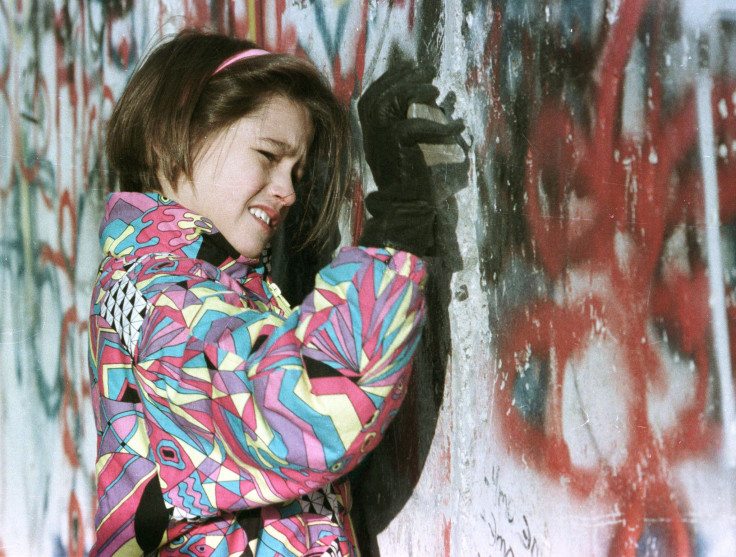How The Berlin Wall Fell: Two Reporters Recall German Announcement 25 Years Later

On Nov. 9, 1989, a room full of reporters were falling asleep to the sounds of an East German government spokesman announcing policy changes and new appointments at a press conference broadcast on live TV when one of recent history's most important breaking news stories suddenly unfolded. Unsure of what they were hearing, the reporters turned to each other: Had the spokesman really just announced the fall of the Berlin Wall?
"We couldn’t believe it; we were shocked,” recalled Robert McCartney, then Central European bureau chief for the Washington Post and now a columnist for the paper. Her spoke Friday, ahead of the 25th anniversary on Sunday. “We kept listening to the tape recording over and over again, saying, ‘no, that can’t be what he means,’ and all the East German reporters were all saying, ‘no, there’s got to be a loophole, he can’t possibly mean that.’”
The dispatch was an announcement stating that East Germans could soon visit West Germany with certain permissions and paperwork. “We have decided today to implement a regulation that allows every citizen of the German Democratic Republic to leave the GDR through any of the border crossings,” said Günter Schabowski, a top Communist Party official. Asked when the policy change would take effect, Schabowski replied “Immediately, without delay.”
The announcement was a major step, but was not intended to mean that Berlin was once again united. Nevertheless, it changed the course of history.
“Schabowski reads this thing at the very end and then just takes off,” recalled Ferdinand Protzman, a professor at Oberlin College in Ohio who was working as a New York Times reporter in Berlin at the time. He was sitting next to McCartney at the press conference that day. “We were left arguing and debating about what it actually meant,” Protzman said Friday.
McCartney and Protzman immediately agreed that the announcement was big and that people would start acting on Schabowski’s words. “The point was that it had just gone out on live television. After weeks and months of protests and debate, you just felt like there was something in the air that night,” said Protzman.
NBC’s Tom Brokaw had an interview with Schabowski immediately after the press conference, so he went over the announcement with him and confirmed its meaning. Brokaw then returned to the press room and told McCartney, Protzman and the other reporters what he had just heard. Everyone dashed back to their hotels in West Berlin to file stories.
Germans across the country watching the press conference took Schabowski’s words for what they were and news spread quickly across Berlin, just as McCartney and Protzman predicted. After a period of confusion, hundreds, then thousands, then tens of thousands of East Berliners started for their closest checkpoint at the wall, demanding to be let across.
Left without any clue as to what was going on or guidance from their superiors, border guards struggled to deal with the mounting crowds. Remarkably, no shots were fired. Around 11:30 p.m., one of the officers in charge at the Bornholderstrasse crossing point, Stasi lieutenant colonel Harald Jäger, knew that he couldn’t hold the crowd outside his post any longer. He gave the order to open the gate and let people through.
By the time the reporters finished writing about the announcement and headed out to the streets for interviews, Berlin was surging with energy.
“One vivid memory I have was of this enormous traffic jam,” said McCartney. “It was gridlock everywhere and it took us forever to get to the wall. By that time, people were standing on top of the wall and chipping away at it with sledgehammers. All of these people from East Berlin were coming across. People were giving them money to go shopping, families were being reunited. It was like a giant, spontaneous party.”

Protzman managed to convince a taxi driver to stay with him all night and shuttle him around the city. The first place they went: Checkpoint Charlie, the best-known wall crossing, famous from Cold War spy thrillers. There were fireworks and rock music blasting. The West German driver helped convince hesitant East Germans to trust Protzman and talk to him for his story. They described the euphoria in a story he filed the next day for the Times. Protzman wrote:
“I don't know what we're going to do, just drive around and see what's going on,” said a 34-year-old East Berliner as he sat at the wheel of his orange Trabant auto on the glittering Kurfürstendamm, West Berlin's main shopping street. “We're here for the first time. I'll go home in a few hours. My wife and kids are waiting for me. But I wasn't going to miss this.”
“I can't describe it,” a young woman said with tears in her eyes. “I would never have believed it possible.” A middle-aged East Berliner summed up his feelings with the words: “Joy, entirely great joy.”
Protzman joined the revelers celebrating on top of the wall, doing what was unthinkable just a day before and would have cost them their lives. “People were just coming up and handing me bottles of wine, champagne and beer; the crowd was just effervescent,” he recalled. “All of these years of repression and horror and death were over."
As the hours wore on, East and West Germans slowly began moving their way back home, content with seeing the other side of the wall. The celebrations lasted for days, but eventually the reality of the complex situation settled in. The two reporters remember the uncertainty in the air.
“The big question then became: ‘so what happens now?’” said McCartney. “Is this the end of the Cold War? No one was quite sure, clearly it was a huge change. … Will this mean the country is going to be reunited?”
German officials weren’t sure either.
“There was a bit of a debate in West Germany about if they wanted that or not," McCartney said. "Everyone knew it was going to be expensive and more than just getting rid of the borders. A lot of people underestimated the 'wall in head' [referring to sociopolitical and psychological divides between the West German and East German populations]. People across the border had completely different ideas of how things should be organized.”
Some West German officials were skeptical about reunification, arguing that it would too expensive to join with the much less prosperous East, but in the end the West agreed to move forward per its longstanding declared policy of seeking an eventual united Germany.
Protzman, who stayed in Germany through the reunification process, said he knew that reunification was inevitable. East Germans would never vote in another Communist government, and the economic opportunities in reunification were simply too good to pass up, he said. The East and West economies were united on July 1, 1990. The two German republics were formally united on Oct. 3.
There were growing pains, concerns over employment and who owned property in East Germany, but the government invested at least $500 million to develop and modernize East Germany in the first five years following reunification.
Protzman recalled going to a state-of-the-art Coca Cola bottling plant the company built in former East Germany after the Berlin Wall fell. It was run by an East German man who had worked in the antiquated East German bottling industry. He was thrilled to be working for Coca Cola.
“I was walking out of the plant through the main factory floor after doing some interviews and I see the plant manager sitting in the control booth at the center of the factory floor," Protzman said. "It’s got all the most modern computing equipment from West Germany. He doesn’t see me, but I’m looking over at him and he was running his hands over the controls like someone who just got a brand new car. The look on his face was like a kid who just got the greatest gift in history.”
McCartney and Protzman both said they knew they were witnessing history at the time of the press announcement. They stayed out late into the night gathering interviews and taking in the once-in-a-lifetime experience.
“Me and my taxi driver would go back and forth from the hotel all night,” Protzman said. “We [journalists] would all run back to the hotel and file, then run back out to the Wall. It was a crystal clear night and just breathing in the Berlin air on that night gave you a rush.”
During one of those stops at the hotel his editor in New York said to him over the phone: “I hope you understand this is a big story.”
“Yeah,” Protzman said. “I know.”
© Copyright IBTimes 2024. All rights reserved.






















